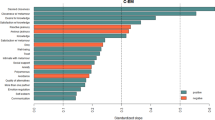Abstract
When taken as prescribed, highly active anti-retroviral medications allow individuals with HIV to live long, healthy lives. Nevertheless, poor adherence is common. In the current study, we examined why some people fail to feel efficacious to adhere, focusing on their interpersonal relationships. Given past findings that some individuals with primary partners adhere better than those without, whereas others adhere worse, we examined whether relationship dynamics influence the association between support from a primary partner and adherence self-efficacy. Specifically, we hypothesized and found that relationship partners’ support regarding medication adherence undermines self-efficacy when the partner is perceived as unwilling to sacrifice for the relationship. We discuss the implications of these results for intervention construction and for understanding the power of the relationship context on HIV medication adherence.

Similar content being viewed by others
References
Ortego C, Huedo-Medina TB, Llorca J, et al. Adherence to highly active antiretroviral therapy (HAART): a meta-analysis. AIDS Behav. 2011;15:1381–96.
Langebeek N, Gisolf EH, Reiss P, et al. Predictors and correlates of adherence to combination antiretroviral therapy (ART) for chronic HIV infection: a meta-analysis. BMC Med. 2014;12:142–55.
Hofmann W, Finkel EJ, Fitzsimons GM. Close relationships and self-regulation: how relationship satisfaction facilitates momentary goal pursuit. J Personal Soc Psychol. 2015;109:434–52. doi:10.1037/pspi0000020.
Chartrand TL, Dalton A, Fitzsimons GJ. Nonconscious relationship reactance: when significant others prime opposing goals. J Exp Soc Psychol. 2007;43:719–26. doi:10.1016/j.jesp.2006.08.003.
Andersen R, Bozzette S, Shapiro M, et al. Access of vulnerable groups to antiretroviral therapy among persons in care for HIV disease in the United States. HCSUS Consortium. HIV Cost and Services Utilization Study. Health Serv Res. 2000;35:389–416.
Protopopescu C, Raffi F, Roux P, et al. Factors associated with non-adherence to long-term highly active antiretroviral therapy: a 10 year follow-up analysis with correction for the bias induced by missing data. J Antimicrob Chemother. 2009;64:599–606.
Johnson MO, Catz SL, Remien RH. Theory-guided, empirically supported avenues for intervention on HIV medication nonadherence: findings from the Healthy Living Project. AIDS Patient Care and STDS. 2003;17:645–56.
Knowlton AR, Yang C, Bohnert A, Wissow L, Chandler G, Arnsten JA. Main partner factors associated with worse adherence to HAART among women in Baltimore, Maryland: a preliminary study. AIDS Care. 2011;23:1102–10. doi:10.1080/09540121.2011.554516.
Wrubel J, Stumbo S, Johnson MO. Antiretroviral medication support practices among partners of men who have sex with men: a qualitative study. AIDS Patient Care STDS. 2008;22:851–8.
Van Lange PAM, Rusbult CE, Drigotas SM, Arriaga XB, Witcher BS, Cox CL. Willingness to sacrifice in close relationships. J Personal Soc Psychol. 1997;72:1373–95.
Johnson MO, Neilands TB, Dilworth SE, Morin SF, Remien RH, Chesnut MA. The role of self-efficacy in HIV treatment adherence: validation of the HIV Treatment Adherence Self-Efficacy Scale (HIV-ASES). J Behav Med. 2007;30:359–70.
Rusbult CE. A longitudinal test of the investment model: the development (and deterioration) of satisfaction and commitment in heterosexual involvements. J Personal Soc Psychol. 1983;45:101–17. doi:10.1037/0022-3514.45.1.101.
Justice AC, Holmes W, Gifford AL, Rabeneck L, Zackin R, Sinclair G, Weissman S, Neidig J, Marcus C, Chesney M, Wu AW, Adult AIDS. Clinical Trials Unit Outcomes Committee. Development and validation of a self-completed HIV symptom index. J Clin Epidemiol. 2001;54(Suppl 1):S77–90.
Newsom JT, Rook KS, Nishishiba M, Sorkin DH, Mahan TL. Understanding the relative importance of positive and negative social exchanges: examining specific domains and appraisals. J Gerontol B Psychol Sci Soc Sci. 2005;60:304–12.
Fitzsimons GM, Finkel EJ, vanDellen MR. Transactive goal dynamics. Psychol Rev. 2015;122:648–73.
Thibaut JW, Kelley HH. The Social Psychology of Groups. New York: Wiley; 1959.
Barclay TR, Hinkin CH, Castellon SA, Mason KI, Reinhard MJ, Marion SD, Levine AJ, Durvasula RS. Age-associated predictors of medication adherence in HIV-positive adults: health beliefs, self-efficacy, and neurocognitive status. Health Psychol. 2007;26:40–9.
Finkel EJ, Slotter EB, Luchies LB, Walton GM, Gross JJ. A brief intervention to promote conflict reappraisal preserves marital quality over time. Psy Sci. 2013;24:1595–601.
Carson JW, Carson KM, Gil KM, Baucom DH. Mindfulness-based relationship enhancement. Behav Ther. 2004;35:471–94.
CDC. (2015). HIV/AIDS: basic statistics. Retrieved: 11 Nov 2015.
Darbes LA, Chakravarty D, Neilands TB, Beougher SC, Hoff CC. Sexual risk for HIV among gay male couples: a longitudinal study of the impact of relationship dynamics. Arch Sex Behav. 2014;43:47–60.
Gamarel KE, Neilands TB, Golub SA, Johnson MO. An omitted level: an examination of relational orientations and viral suppression among HIV serodiscordant male couples. J Acquir Immune Defic Syndr. 2014;66:193–6.
Author information
Authors and Affiliations
Corresponding author
Ethics declarations
Conflict of interest
All authors declare that they have no conflict of interest.
Ethical approval
All procedures performed in studies involving human participants were in accordance with the ethical standards of the Syracuse University research committee and with the 1964 Helsinki declaration and its later amendments or comparable ethical standards
Informed consent
Informed consent was obtained from all individual participants included in the study.
Rights and permissions
About this article
Cite this article
VanderDrift, L.E., Ioerger, M., Mitzel, L.D. et al. Partner Support, Willingness to Sacrifice, and HIV Medication Self-Efficacy. AIDS Behav 21, 2519–2525 (2017). https://doi.org/10.1007/s10461-017-1698-5
Published:
Issue Date:
DOI: https://doi.org/10.1007/s10461-017-1698-5



